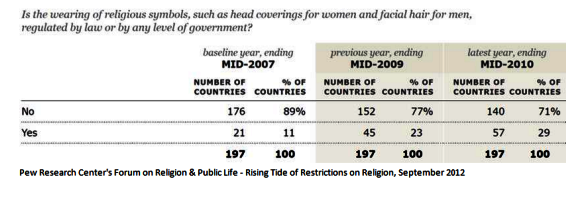By Brian J. Grim
The European Court of Human Rights today announced decisions on several high profile religious freedom cases involving the United Kingdom, including two complaints that British law inadequately protects employees’ right to display symbols of their religion in the workplace.
The court found that there had been a violation of religious freedom in the case involving a British Airways employee who was barred from visibly wearing Christian crosses around her neck while at work. However, in the second case involving a nurse in the geriatric ward of a British hospital, the court found that the protection of health and safety on a hospital ward justified her employer’s prohibition on wearing a visible cross necklace.
A recent study by the Pew Research Center’s Forum on Religion & Public Life found that regulations on the wearing of religious symbols increased globally between mid-2007 and mid-2010. In mid-2010, religious attire and other symbols were regulated in 57 countries (29%), up from 21 countries (11%) in mid-2007. Regulations increased in places as diverse as France, where the burqa was banned, and Rwanda, where the government prohibited religious headgear in photos for government documents.

Regulations on religious attire differ widely. Some countries ban religious garb; Turkey, for example, bars women from wearing headscarves in government offices. In other countries, such as Saudi Arabia and Iran, religious coverings are required for women. And in Jordan, the Tourism Ministry recently advised Israeli visitors to avoid wearing Jewish attire while in the country, reportedly out of concern for their safety.
The European Court also announced decisions in a pair of cases involving employees who contend that U.K. laws fail to protect their right to object to homosexuality on religious grounds. The court did not uphold their complaints, finding that the right to manifest religion at work is protected but must be balanced against the rights of others.
The court decision was reported widely in the British and international press.
- British Airways Christian employee Nadia Eweida wins case
- Landmark European court judgment on religious freedoms due
- Split ruling on discrimination against UK Christians
- European court rejects three UK faith bias complaints
Brian J. Grim is a senior researcher and director of cross-national data at the Pew Forum on Religion & Public Life.




